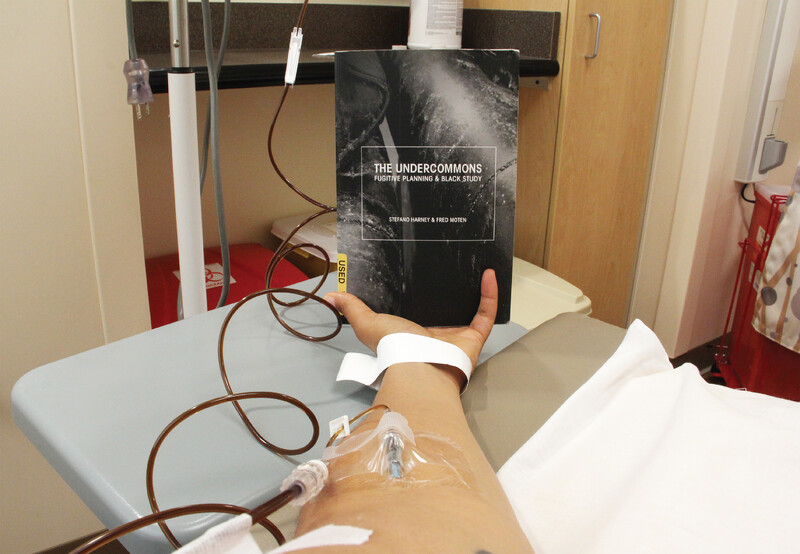
Take Care’s fifth circuit, Collective Welfare, glimpses typically sequestered and private spaces of care. The projects in this circuit juxtapose three sites of the institutional mediation of care: hospital, prison, hospice. These sites offer a reminder that the welfare state, in all its ambivalence, is a decisive front in the crisis of care. Reframing practices of individualized care as fundamentally social matters, this circuit works across video, photography, social media, and temporary architecture to bear witness to care’s pace, failure, and stratifications. Collective Welfare circulates images of the entanglement of the chronically ill body and the biomedical industrial complex; materially fabricates the incompatibility of care and incarceration, and shifts perspective on mass incarceration as symptom, and strategy, of care crisis; and screens moving images of dying, generated from an intimate hospice setting, trialling new ways of taking care with death aesthetically. Collective Welfare reveals the persistence of alternative habits of care and relations of interdependency, from the hospice tradition to prison abolition to communities of independent study. Closing Take Care, this circuit also revisits a hypothesis with which this exhibition series opened: that care is a vital conceptual device for a process of political recomposition that would deepen linkages across contexts and conflicts in the spheres of social reproduction and ecology.
—Letters & Handshakes
How To Order
To order any of our publications, please send an email including title(s), number of copies, and your mailing address to: blackwood.gallery[at]utoronto.ca.
Letters & Handshakes’ past projects include the exhibitions I stood before the source and Precarious: Carole Condé + Karl Beveridge, the forum Fighting Foreclosed Futures: Politics of Student Debt, and the symposium and micropublication Surplus3: Labour and the Digital.
Shaw’s work convenes, enables, and amplifies the transdisciplinary thinking necessary for understanding our current multi-scalar historical moment and co-creating the literacies, skills, and sensibilities required to adapt to the various socio-technical transformations of our contemporary society. She has applied her commitment to compositional strategies, epistemic disobedience, and social ecologies to multi-year curatorial projects including Take Care (2016–2019), an exhibition-led inquiry into care, exploring its heterogeneous and contested meanings, practices, and sites, as well as the political, economic, and technological forces currently shaping care; The Work of Wind: Air, Land, Sea (2015–2023), a variegated series of curatorial and editorial instantiations of the Beaufort Scale of Wind Force exploring the relentless legacies of colonialism and capital excess that undergird contemporary politics of sustainability and climate justice; and OPERA-19: An Assembly Sustaining Dreams of the Otherwise (2021–2029), a decentralized polyvocal drama in four acts taking up asymmetrical planetary crisis, differential citizenship, affective planetary attention disorder, and a strategic composition of worlds. She is the founding editor of The Society for the Diffusion of Useful Knowledge (Blackwood, 2018–ongoing), and co-editor of The Work of Wind: Land (Berlin: K. Verlag, 2018) and The Work of Wind: Sea (Berlin: K. Verlag, 2023).
Greig de Peuter is Assistant Professor in the Department of Communication Studies at Wilfrid Laurier University. He researches the contested political economy of media and cultural production, with an emphasis on work, labour, and employment. He is currently collaborating with Enda Brophy and Nicole Cohen on a multi-country study of precarious labour politics in creative industries. His most recent book, co-authored with Nick Dyer-Witheford, is Games of Empire: Global Capitalism and Video Games (University of Minnesota Press, 2009). His writing has appeared in The Fibreculture Journal, Journal of Communication Inquiry, Journal of Cultural Economy, and several anthologies. His article with Cohen and Brophy, “Interns, Unite! (You Have Nothing to Lose—Literally),” received the 2013 Canadian Association of Journalists/Communication Workers of America—Canada Award for Labour Reporting. He has been active in collectively run autonomous education and curatorial projects, including the Toronto School of Creativity & Inquiry (2005-2010), and Letters & Handshakes (from 2014).
Matthew Hoffman
Printing
Thistle Printing
The Blackwood Gallery is grateful for additional support for Collective Welfare from the Graduate Expansion Fund, Department of Visual Studies, and Women and Gender Studies (UTM).
The Interval and the Instant is a multiscreen video installation commissioned by Fabrica Gallery (Brighton, UK) as part of the programme Into That Good Night, a five-year initiative to generate positive change in awareness of death and dying.
Funding for staff support was made possible through the Young Canada Works in Heritage Organizations Graduate Internship program, Department of Canadian Heritage. The Canadian Museums Association administers the program on behalf of the Department of Canadian Heritage.


Collective Welfare
Micropublication produced on the occasion of Collective Welfare, Circuit 5 of Take Care, February 12 – March 11, 2018.
Featuring project descriptions, a curatorial statement by Letters & Handshakes, artist biographies, and full colour illustrations throughout. Edited by Letters & Handshakes.
Free

The Blackwood
University of Toronto Mississauga
3359 Mississauga Road
Mississauga, ON L5L 1C6
[email protected]
(905) 828-3789
The galleries are currently open. Hours of operation: Monday–Saturday, 12–5pm, Wednesdays until 8pm.
Facebook | Twitter | Instagram
Sign up to receive our newsletter.
The Blackwood is situated on the Territory of the Mississaugas of the Credit, Seneca, and Huron-Wendat.